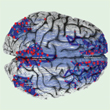Monday, 15 July 2013
The Brain’s Default Network

What does the human brain do when it’s not doing anything in particular? At first glance, this question might seem of little interest, and for many years most brain researchers paid little attention to it. But over the past 10 years or so, it has become one of the hottest and most intriguing research topics in neuroscience: the activity of the brain’s default network.
The default network is a set of areas in the brain that are connected to one another, in some cases across large distances (in terms of the brain’s size). They are activated preferentially when the individual is not performing any specific task. Scientists do not yet know exactly what purpose this default brain activity serves. But they do already know that the areas involved in the default network are more active when our minds are wandering (when we have “our heads in the clouds”), when we are evoking personal memories, and when we are trying to imagine ourselves in future situations or to understand someone else’s point of view. (more…)
The Emergence of Consciousness | Comments Closed







